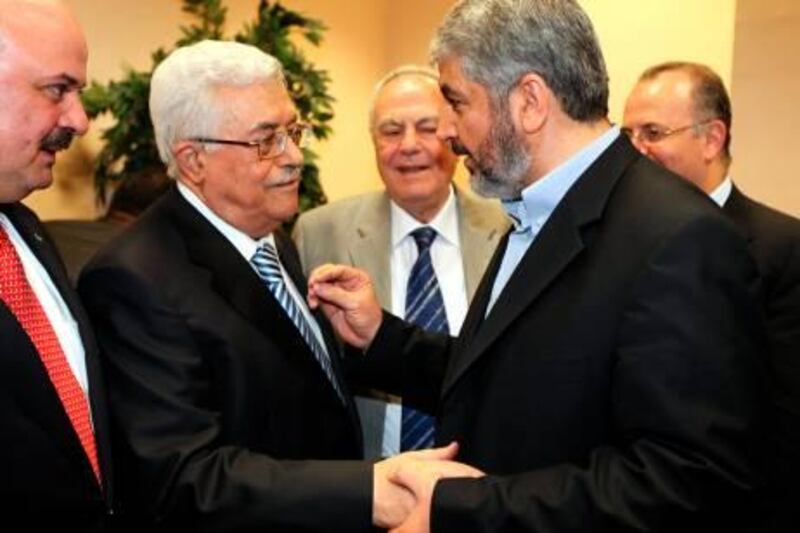CAIRO // Hamas and Fatah formally signed a reconciliation deal in the Egyptian capital yesterday aimed at ending the four-year feud that has divided Palestinians between rival governments.
The former enemies plan to set aside their animosity for a single interim government of technocrats composed of neither faction's members, preparing the way for Palestinian elections within a year.
The event at Egypt's intelligence headquarters marked Cairo's dramatic foreign policy shift since the February revolution that ousted the country's president of three decades, Hosni Mubarak.
The bringing together of Fatah and Hamas leaders at the ceremony was the latest example of Egypt's interim government spurning the US and Israel, who relied on Mr Mubarak as a dependable ally and view Hamas as a terrorist organisation.
Addressing an audience of Palestinians, Mahmoud Abbas, the Palestinian Authority president and Fatah chairman, said: "We announce we have turned the black page of division for ever."
Israel's prime minister, Benjamin Netanyahu, immediately condemned the unity ceremony as "a tremendous blow to peace and a great victory for terrorism".
"Three days ago terrorism was dealt a resounding defeat with the elimination of bin Laden. Today in Cairo it had a victory," he said.
The Israeli leader has made no effort to hide his distaste for Palestinian unity, repeatedly calling on Mr Abbas to choose between peace and reconciliation with Hamas. Talks with Mr Abbas faltered in September after Israel's government refused to extend a partial moratorium on Jewish settlement construction.
In his address, Mr Abbas referred to Mr Netanyahu's opposition to the pact as blackmail and said it was "no longer possible for us to accept the occupation of Palestinian land".
Hamas, he said, "are our brothers and family. We may differ, and we often do, but we still arrive at a minimum level of understanding."
Khaled Meshaal, Hamas's Damascus-based leader, used his address to call for a Palestinian state on land Israel conquered in the 1967 Arab-Israeli war. While Hamas's founding charter calls for the elimination of Israel, the group, in practice, has leaned toward a long-term truce.
"Our aim is to establish a free and completely sovereign Palestinian state on the West Bank and Gaza Strip, whose capital is Jerusalem, without any settlers and without giving up a single inch of land and without giving up on the right of return" for Palestinian refugees, he said.
The Hamas leader offered to work with Mr Abbas and Egypt to solve the Arab-Israeli conflict but said he did not believe Israel was ready for peace with any Palestinians.
Uniting the fractured Palestinian political landscape, however, is a daunting task. Many of the issues that dogged previous unity attempts still appear unresolved, not least control over their respective security forces and negotiations with Israel.
A draft of the agreement signed on Tuesday and obtained by The Associated Press appears vague on the key issues. Its only reference to security services says "there should be an agreement over the Higher Security Committee" which will be formed by a presidential decree and "comprise professional officers".
Analysts say the accord may be more cosmetic than real, and its motives tactical. Mr Abbas and the PLO hope a unified Palestinian government will increase the chances of UN recognition of an independent state in September. Hamas does not want to be labelled the spoiler of a unity deal, and is under pressure to relieve Gaza of Israel's blockade.
In March, there were mass demonstrations across the Palestinian territories, calling for Palestinian unity.
Mohammed Youssef, a 23-year-old business student at Gaza's Al Azhar University who helped organise the March 15 rallies using Facebook, said: "We are happy about what they achieved with the reconciliation, but we're still waiting for them to actually implement it."
He, like many Palestinians, has grown frustrated by the paralysed political system, which has not held national elections since 2006. That was the year Hamas emerged with a majority of seats. A unity government fell apart shortly thereafter, culminating in a short civil war a year later in which Hamas violently ousted their Fatah enemies from Gaza. Since then, leaders from both sides have ruled their respective territories by decree.
"I've asked many Facebook users about the deal, but many of them say they won't believe it until they see it," Mr Youssef said.
The catalyst for these demonstrations has been the revolutions that toppled leaders in Egypt and Tunisia, and which have threatened the rule of Syria's president, Bashar al Assad.
Many speculate that Hamas was particularly keen on striking an agreement with Fatah out of fear of losing their base in Damascus.
In Egypt in particular, the revolution has led the government to place Palestinian unity above other political considerations, said Mustafa Barghouti, a Palestinian politician involved in the unity negotiations.
"The positive changes in the Arab world provide a very good possibility for supporting the unity agreement," said Mr Barghouti.
He pointed out that Egyptian officials under the former Egyptian president had worked, and failed, for roughly two years to secure such an agreement.
Mark Toner, a US State Department spokesman, spoke cautiously at a news conference before the Cairo ceremony.
"If and when a new Palestinian government is announced, we'll assess that based on its composition," Mr Toner said. "Hamas needs to abide by the quartet principles in order to play a role in the political process."
* Hugh Naylor reported from Jerusalem





